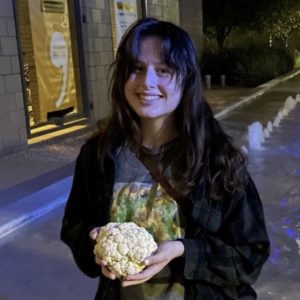In this series, we’re meeting with Swette Center team members to explore their background in food systems, what they are currently working on, and their vision of food systems transformation.
Read on for an interview with Elora Bevacqua, Student Worker.
When did you first get interested in food systems work?
I grew up on a mini farm with chickens, horses, goats, etc. I woke up at 5:30am with my family for most of my life to go outside and take care of everything. Back then it was all a chore and I didn’t see the value in it. My mom made me garden with her and we always planted too many tomatoes and would have to find ways to preserve them. My favorite thing I did growing up was taking care of the chickens. I showed chickens in 4-H and now I know way too many things about them. I didn’t formally get introduced to food systems until I came to ASU. I joined the gardening club and realized that gardening is something people actually do for enjoyment and not only for necessity. From there I kept learning more and it led me to decide to get a certificate in sustainable food systems. Working for the Swette Center has also been a huge part of why I want to work in food systems. Listening to the experiences of others has broadened my understanding of it. In the future, I plan to get my master's in sustainable food systems.
What are you working on currently?
I am the social media and marketing aid for Swette. I make all the content that goes on our social media platforms. This typically includes whatever projects the Center is working on at a given time. I have a few ‘campaigns’ that follow a weekly or biweekly posting schedule, like food systems facts, team member interviews, and blogs off of our website. I also have to work on finding ways to increase engagement on our platforms so that people know what we are up to. I have a side project reviewing farmers markets but I haven’t put much time into that yet.
What do you think is a priority in transforming food systems?
I think it would be good if we diversified our diets more. We rely on very few crops to sustain the entirety of our world and that is a bit scary to think about. If suddenly something were to happen to corn, the entire globe would be impacted. We need to start normalizing eating foods native to or grown where we live, instead of eating food grown and imported from all over the world. This would make our food systems much more resilient.
Any advice for current food systems students?
I don’t think I am very qualified to give advice since I’m still a student, but if I had to say something, it would be to never stop learning and be willing to change your opinions. Sometimes I think I know a lot about a subject and then I’ll learn something new that totally shifts my views. This is especially true in food systems because it is a newer concept, so things are ever-changing. One can never know enough about anything, so keep an open mind.
What is your favorite food to make?
I love to cook. I didn’t realize this until I started living independently and had more control over my groceries and meals. When people enjoy what I make them it makes me happy and is a bit of a self-validation tactic. My favorite food to make would be a breakfast meal composed of air-fried golden potatoes, a spinach onion cheese tomato omelet, and strawberry jam toast. It does not take too long to make and it is very filling. Breakfast is just great in general because it sets you up for the rest of the day.
